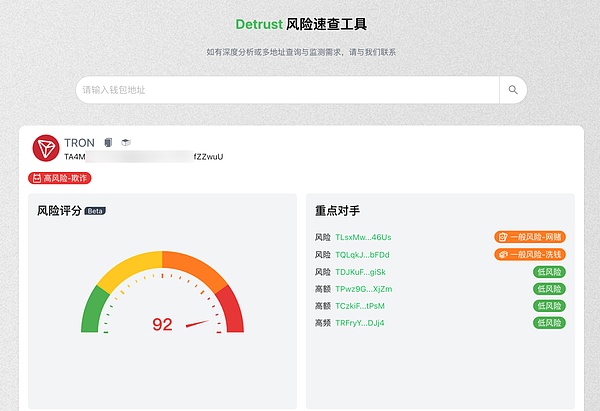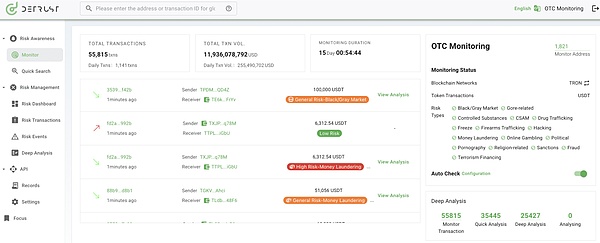According to Bitrace data, during the period from January 2021 to September 2023, a total of more than 41.52 billion risky USDT flowed into some centralized trading platform addresses, and 33.46 billion risky USDT flowed into encrypted payment platform addresses. It can be seen that USDT is being used in large quantities for online gambling, money laundering, and other activities. Such risky funds flowing into the market can easily pollute innocent addresses.
In this context, it is very necessary to audit the funds of the counterparty's receiving address before the transfer. This article will explore the KYT (Know Your Transaction) practice in the field of cryptocurrency and provide practical solutions.
Challenges faced by KYT
Address anonymity
The anonymity of cryptocurrency transactions provides users with a higher degree of privacy protection and financial freedom. This technical means hides the direct connection between the user's real identity and transaction activities.
But just like the two sides of a coin, this anonymity also brings problems, especially when cryptocurrency is used for illegal activities, it brings challenges to supervision and law enforcement. In addition, the anonymous feature makes it difficult to track encrypted fund transfers. Even if the address is found, it is difficult to find the entity behind the address.
Complex judgment
Not all addresses associated with risky funds are illegal addresses. It is too arbitrary to judge the address risk from a single dimension. Take the Tornado Cash poisoning incident as an example. Some anonymous addresses sent 0.1ETH from the sanctioned Tornado Cash wallet to the wallet of a well-known crypto individual, causing the latter to passively trigger the risk control rules and be unable to access some DeFi protocols.
In this incident, the platform adopted inappropriate KYT rules, which led to loopholes in its business operations and brought a bad user experience. Therefore, whether an address is sanctioned or not requires identifying its initial purpose of confusing the source of funds, making full investigation and reasonable assessment. Obviously, the poisoned address in the above case should not be simply regarded as a risky address.
Regulatory environments vary from country to country
For the cryptocurrency industry to achieve true compliance, it must ensure that all related parties participate in supervision at the same time and reach a consensus.
Take Pavel Durov, the Russian founder of Telegram who was arrested in France recently, as an example. He is facing charges of terrorism, money laundering and drug trafficking. France arrested Pavel Durov for allegedly allowing criminal activities to occur on the app; in countries such as Russia and Ukraine, Telegram is widely used as a communication platform because of its excellent confidentiality. According to Russia Today, after Durov was arrested, Davankov, deputy chairman of the Russian State Duma (lower house of parliament), immediately protested and called on the French government to release Durov.

Source GETTY IMAGES
It can be seen that compliance supervision is crucial in any market. Although cryptocurrencies can easily circulate across borders, the use of cryptocurrencies for crimes requires sanctions from the real world. In reality, there are obvious differences in the regulatory environment of various countries. The attitudes towards cryptocurrencies in different regions often make it difficult for relevant entities to cooperate with each other and cause friction. Different definitions of compliance lead to regulatory barriers.
Bitrace's KYT Practice
Address Tag Library
Based on machine learning and pattern recognition algorithm modeling, Bitrace has accumulated more than 400 million address tag libraries, including entity tags (DeFi platforms, mining pools, digital asset exchanges, etc.) and risk behavior tags (fraud, terrorism, drug-related, illegal online gambling, money laundering, gray and black industries). In addition, the data of the address tag library also comes from partners and customers seeking assistance. Such risky addresses and related intelligence will be verified by the technical team for a second time, and the confirmation will be recorded in the library.
The rich address tag library not only makes the entities behind the anonymous addresses traceable, but also helps to screen the financial risks of the counterparties. For example, in scams such as using bad checks to defraud USDT and depositing ETH in fake Binance mining pools and returning BNB, Bitrace found that the addresses used in the scams had a history of interacting with risky addresses of black and gray industries long before the fraud was carried out, and were displayed as high-risk fraud addresses in Detrust's newly launched risk quick check tool. It can be seen that a quick check of the counterparty's risk address before the transaction can effectively avoid fraud.

Tool link https://detrust.bitrace.io/detrust-blacklist/
Detrust
Based on Bitrace's leading criminal risk label database, address profiling, and criminal funds monitoring and early warning capabilities, Detrust provides relevant data for crypto companies, helps companies identify cryptocurrency transactions involving illegal activities by analyzing counterparty behavior, and monitors anomalies by comparing current transactions with their historical behavior.
The Monitor function supports real-time automatic detection of each transaction, based on pattern analysis, behavioral deviation analysis, and cluster analysis, to achieve the first-time reminder and assistance in handling when users transfer risky funds, so as to reduce the risk of criminal funds association and business compliance.

Detrust Client
Customized Risk Control Strategy
The product supports users to customize risk control strategies and take different responses to specific types of risk events, rather than being limited to the platform's default rules. For example, rules will only be triggered under specific risk ratios, risk categories, risk sources, and regional policies, giving users greater freedom to adapt to local compliance systems.
Written in the End
Cryptocurrencies, especially stablecoins represented by USDT, are widely used by many crypto companies for daily fund collection and payment. Such companies often need a complete KYT mechanism to achieve compliance risk control and protect user funds.
In the future when the global regulatory environment is becoming increasingly stringent, KYT practices will transform from compliance requirements to industry standards, helping to build a more secure, transparent and efficient trading environment and promote the healthy development of the blockchain industry.









